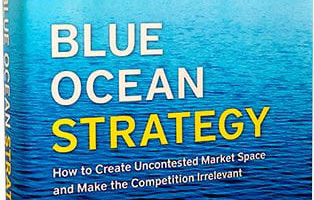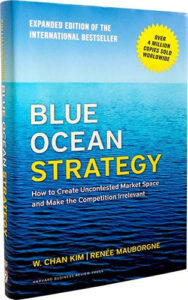
I teach a strategy class at Boston University’s Questrom School of Business. This month, we have been discussing what is known as “Blue Ocean” strategy. In short, Blue Ocean suggests that rather than seeking differentiation from competitors, organizations should work to define completely new industries (“spaces”) in which there are no competitors at all.
One often-cited example is Nintendo. For years, the company had engaged in a long-standing battle with Microsoft and Sony involving a never-ending arms race over graphics quality and game pace. That is, until 2006, when Nintendo launched the “Wii” — a game with notably less graphic and action capabilities but with an entirely different type of game console.
While not appealing to traditional “gamers,” it attracted a new, older audience. (Never mind that many of them lost grip of their hand-held controllers and threw them through their TV screens… Nintendo eventually fixed that with wrist straps!)
Is it Possible to Have No Competition?
It’s an intriguing and attractive concept to be in a space with no competitors. But does such a space exist? After all, when advising entrepreneurs who are pitching investors about a new business, I tell them that there are always competitors and that failing to take competition into consideration is a mistake. How can both of these things be true?
I think the answer depends on how narrowly “competitor” is defined. Often, people only consider direct competitors — those who do what they do in the way they do it. However, when you think more expansively, you discover other forms of competition…
Indirect competitors. Long ago, AT&T failed to consider that new players like MCI would not be its only rival for long-distance phone calls. There were also free, computer-to-computer services like Skype and (later) ubiquitous mobile phone plans.
Time competitors. Nintendo’s Wii may not have been competing against PlayStation and X-Box. But it was still in competition against every other form of new and traditional recreation — traditional card games, ping-pong, television, etc. — for the limited free time of its potential audience.
Nonprofit competitors. With such a broad range of nonprofit types, these organizations often neglect to think beyond their own particular focus. For example, an Opera company is not only in competition with other opera companies. It also competes with plays, musicals, orchestras, and even movies within its local area. There are only so many evenings most patrons will go out to a live performance.
Philanthropic competitors. With multiple organizations serving overlapping social issues — whether related to conservation, environment, disease, etc. — there is competition for what are always a limited amount of dollars.
For many social service organizations, this is further complicated by the fact that the beneficiaries of their services are typically not the same people who pay for them. Here, the philanthropic organization in question is both competing for funding with other organizations and competing with alternatives that serve those same communities.
Inertia. Of course, the biggest competitor of all is that your potential customer decides to do nothing… not buy any product, not attend any event, not donate any time or money to a cause.
So, given all the competition that exists in all its various forms, is there any point in seeking a “Blue Ocean?” I believe there is. There are many examples where selecting a different way of approaching something or offering a new and unique combination of features or services can create a sizeable advantage.
In mature industries in particular, where organizations may have enjoyed little direct competition, there is often a lack of innovation or commitment to service quality, allowing new, better offerings to emerge (think streaming services vs. those hated cable boxes!).
Still, if you do uncover a Blue Ocean, always consider possible innovations that may emerge down the road. Direct competitors that may not have presented an initial threat may change their offering. New technology or new regulations might enable previous competitors, if not entirely new organizations, to offer an alternative that you may not have anticipated.
It’s worth keeping in mind as well that no competitive advantage, Blue Ocean or otherwise, is likely to last forever.










